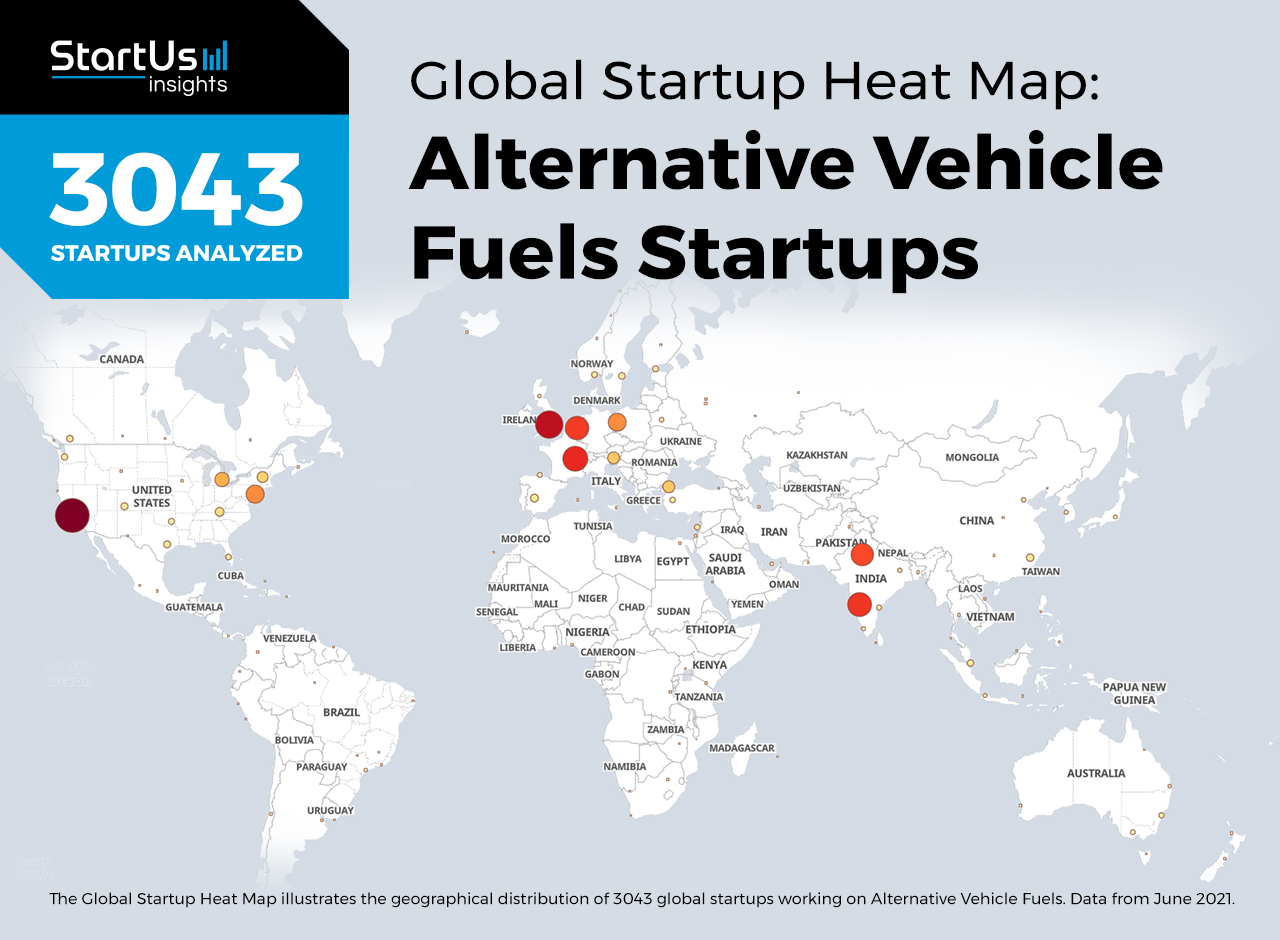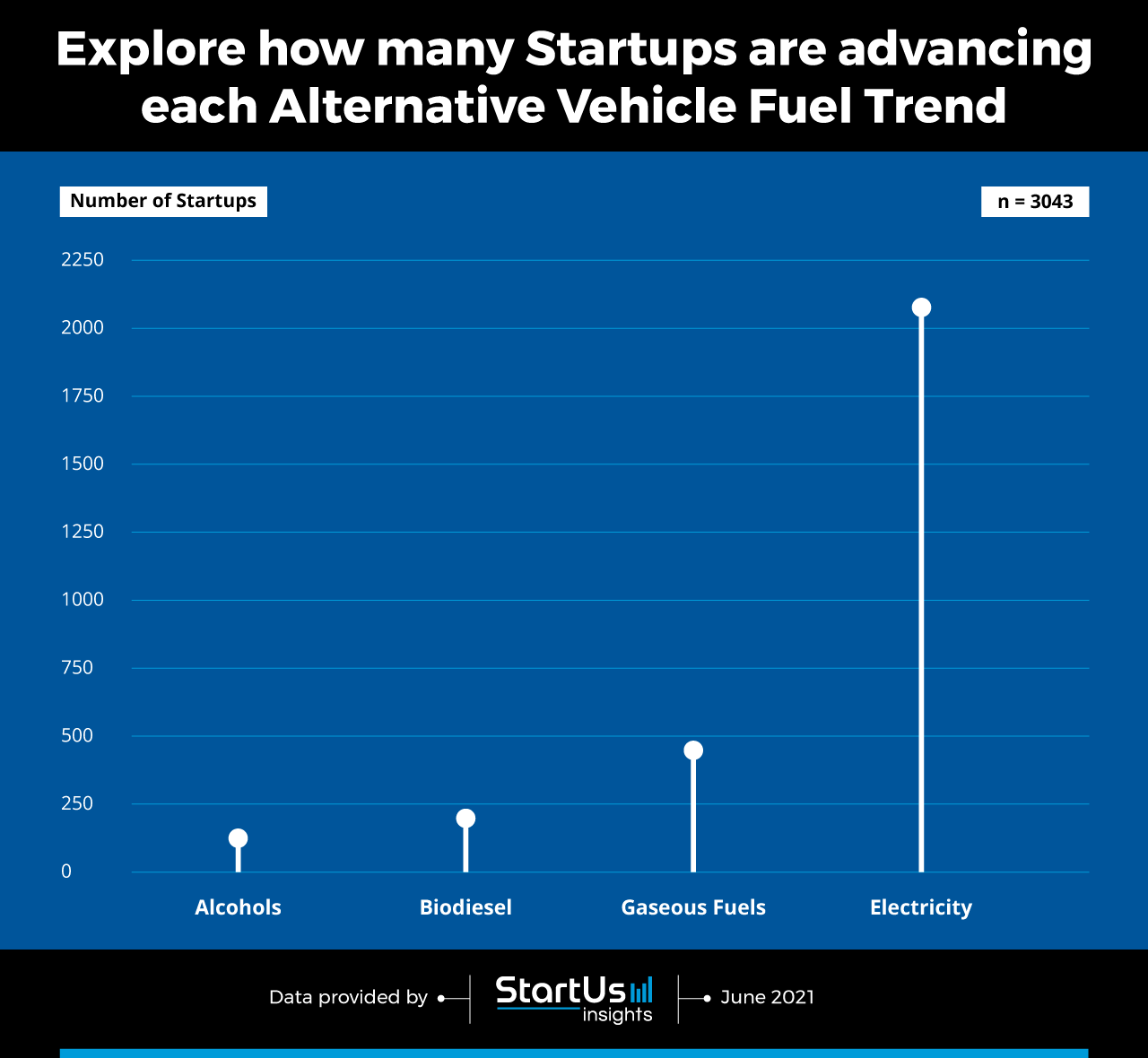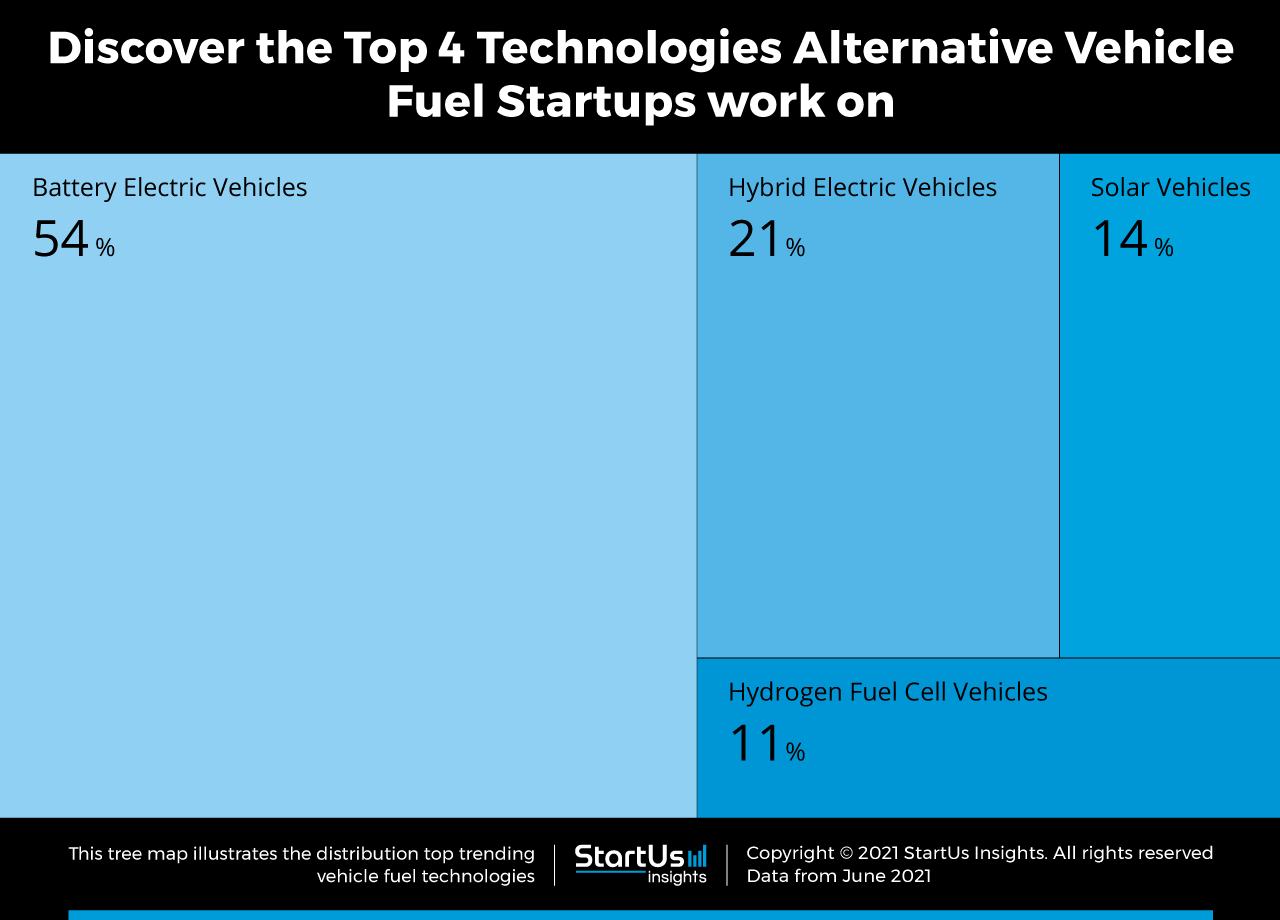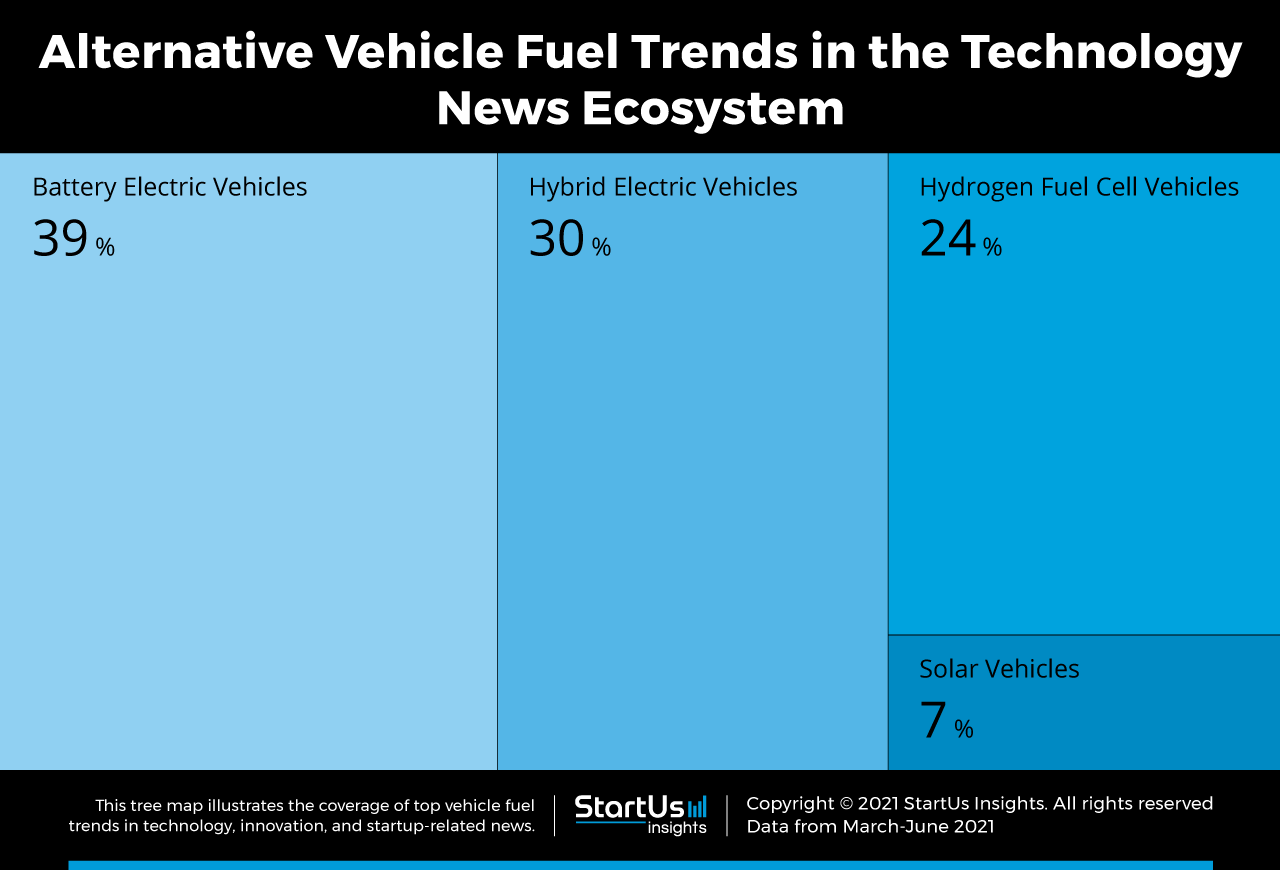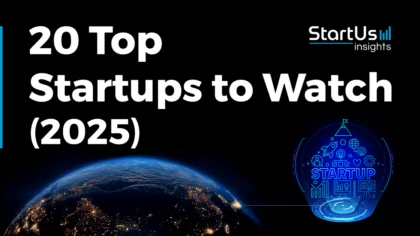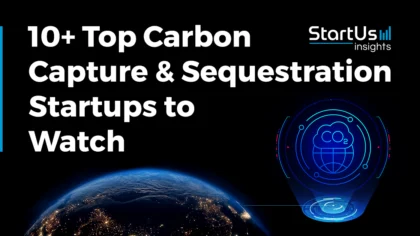Today, transport is responsible for around one-fifth of the total carbon dioxide (CO2) emissions. And as the global population increases, transport demands are expected to grow even further. To mitigate the emissions growth that comes with this increasing demand, research organizations, large enterprises, scaleups, and emerging companies explore and develop a suite of CleanTech solutions that redefine how and what we drive.
Even though vehicle sustainability is mostly associated with electric cars for good reason, the market of sustainable fuels also encompasses gaseous and alcohol-based solutions, as well as clean diesel alternatives. This report leverages the Big Data & Artificial Intelligence (AI)-powered StartUs Insights Discovery Platform, covering over 2 million startups & scaleups globally, to provide you with data-driven innovation intelligence into the leading sustainable alternative vehicle fuel solutions and top clean vehicle trends.
Global Heat Map shows Distribution of 3.043 Startups & Scaleups working on Sustainable Vehicle Fuels
As a company with the mission to map the world’s information on innovations, emerging companies, and technologies, we routinely look into emerging solutions that impact businesses around the world. This time, it is all about identifying emerging companies that advance sustainable vehicle fuel solutions and their impact on the environment.
The Global Startup Heat Map below gives you a picture of where the major alternative vehicle fuel hubs are, as well as up-and-coming regions that show significant activity in the field based on our sample of 3.043 startups. More precisely, alternative fuel startups are primarily located across the United States and the UK. Other regions showing promising involvement in sustainable vehicle fuels include France, the Netherlands, and India.
Startups Are Advancing Major Alternative Vehicle Fuels
The term ‘alternative fuels’ refers to any fueling material or substance other than fossil fuels, coal, or natural gas. Different countries have their own lists of fuels they consider an alternative. However, the most common items on such a list are electricity, gaseous fuels, such as hydrogen and propane, alcohols, such as ethanol and methanol, as well as biodiesel fuels.
Electricity
Electricity as an alternative fuel has significant recognition as automotive companies such as Tesla, Volkswagen, Hyundai, and General Motors have established themselves on the vehicle market with their battery-electric vehicles (BEVs) and hybrids. Moreover, companies keep introducing new electric car models, an example of which is Ford’s F-150 Lightning electric truck announced this May. Furthermore, the electric car trend draws interest from tech giants from other industries, such as Apple, which plans to release its own electric vehicle by 2024. Consequently, it is no surprise that companies advancing electricity as a fuel comprise a vast majority of the sustainable vehicle pool.
Using our Discovery Platform, we analyzed startup activity in the alternative vehicle fuel sector. According to our data, over 2.075 startups & scaleups drive the development of electric vehicle technologies worldwide. These startups work on BEVs, hybrid-electric vehicles (HEVs), and plug-in hybrids (PHEVs), as well as advance the electric vehicle infrastructure. Additionally, electric vehicle startups develop concepts such as the solar vehicle.
Horizer offers Solar Mobility Solutions
German startup Horizer designs, develops, and produces solar modules as well as energy generation and storage solutions for vehicles. The startup utilizes thin-film solar foil, which applies to curved vehicle roofs. Horizer’s technology is applicable to BEVs, HEVs, and internal combustion engine vehicles. With its photovoltaic (PV) solutions, the startup allows vehicle owners and fleet managers to reduce energy and fuel consumption, as well as vehicles’ CO2 emissions.
Alternative Gaseous Fuels
The representation of alternative gaseous fuels is almost 4 times smaller than that of electric vehicles. Led by startups developing hydrogen fuel technologies, gaseous fuel solutions still draw the attention and expertise of over 450 startups worldwide. Aside from hydrogen fuel cell innovations, these startups work on compressed natural gas (CNG) and liquified natural gas (LNG) vehicle fuel solutions, as well as biogas, and propane fueling technologies.
Bayan Energy builds Biogas Plants
Indian startup Bayan Energy develops and constructs plants for biogas generation from organic matter. The startup builds fixed dome and floating dome structures, as well as residential, commercial, and industrial biogas plants. By processing such materials and substances as municipal solid waste, wastewater sludge, and agricultural biomass, Bayan Energy provides clean fuel for automotive and industrial applications.
Biodiesel Fuels
Vegetable oils, algae, animal fats, and restaurant grease are often repurposed as renewable and biodegradable diesel alternatives. Used in a blend with fossil fuel-based diesel or in a clean state, these biodiesel fuels decrease greenhouse gas (GHG) emissions from vehicles. Currently, over 200 startups advance biodiesel fuel technologies by expanding the list of viable sources for the fuels and exploring new production techniques.
Algae Biodiesel turns Algae into Clean Gasoline
Turkish startup Algae Biodiesel produces biodiesel through wastewater and flue gas treatment. The startup constructs algal production facilities for major CO2 sources such as power stations and cement kilns. Algae Biodiesel utilizes the CO2 fixation and storage abilities of algae to produce clean diesel and reduce exhaust emissions.
Alcohols as Fuels
The utilization of neat alcohol fuels, as well as their blends with diesel, is not a novel concept in the transportation industry. However, as calls for the industry’s decarbonization grow stronger, the clean-burning properties of substances such as ethanol and methanol receive increasing attention. At present, according to our data, 130 startups worldwide innovate alcohol fuel production and application methods.
Blue World Technologies develops Methanol Fuel Cells
Danish startup Blue World Technologies develops and manufactures methanol fuel cell systems and components. The startup combines polymer electrolyte membrane (PEM) technology with methanol-reforming to increase energy conversion efficiency. Blue World Technologies’ fuel cells integrate with both vehicles and stationary systems, providing fueling for the automotive, heavy-duty, and maritime industries, as well as for stationary power generators and auxiliary power units.
Discover the Top 4 Alternative Vehicle Fuel Trends
Although hybrid electric vehicle development has been active since the nineties, BEVs show significantly higher environmental impact because they do not rely on the internal combustion engine compared to their counterparts, BEVs and PHEVs. Therefore, major car manufacturers are more eager to advance battery-electric technologies. Moreover, considering the tightening emissions regulations, BEVs provide a stronger economic incentive for fleet managers in the long run.
Accordingly, startups and scaleups worldwide dedicate a great deal of focus to advancing battery electric technologies. Startups improve battery capacities, increase vehicle charging speeds, and develop recyclable batteries. According to our data, over 690 startups advance battery-electric technologies while over 270 startups work on hybrid electric and plug-in hybrid vehicles. Further, over 170 startups explore photovoltaic technology to unlock solar as an additional power source for EVs.
Additionally, in recent years, hydrogen fuel cell technologies see a boost in confidence from businesses and governments. Although the automotive industry is still caught up in the debate about the efficiency of the hydrogen fueling process and the technology’s benefit over battery electric vehicles, companies increasingly adopt hydrogen fuel cells. The fuel cells are especially effective for larger vehicles as the hydrogen fuel tank is significantly lighter than an electric battery, which gives trucks and busses running on a fuel cell a weight benefit over battery-powered fleets. Accordingly, over 140 startups worldwide advance hydrogen fuel cell technologies and infrastructure.
HV Systems manufactures Hydrogen-Electric Commercial Vehicles
British startup HV Systems designs and manufactures medium and heavy-duty commercial vehicles. The startup’s vehicles integrate proprietary modular fuel cell powertrains with a power-dense fuel cell system and heavy-duty eAxle. The vehicles contain both hydrogen storage and Li-Ion batteries, which allows them to significantly increase driving range.
Sustainable Vehicle Fuel Trends Showcased in the Technology News Ecosystem
By analyzing the last 3 months of news signals from technology, innovation, and startup-related outlets, we have built a representation of top clean vehicle trends in the media ecosystem. Not surprisingly, BEVs receive the most coverage due to the battery technology’s progress, potential, and new car model releases. However, hydrogen fuel cell vehicle technologies, which trail behind BEVs in startup activity, receive great exposure in the news. Will that exposure transform into more businesses flocking to the technology? We will keep you updated!
How can your company profit from alternative vehicle fuel solutions?
The development of EVs shows no intention to stop, continuously involving new players. In addition, gaseous, alcohol, and biodiesel fuels keep increasing their relevance as fossil fuel alternatives. After all, reducing the negative climate impact of the automotive industry requires further scaling of all these technologies. Already, major car manufacturers go as far as announcing that they will gradually pull away from producing internal combustion engines.
Regardless of your industry and the solutions you are looking for, we will provide you with data-driven insights into promising sustainable fuel startups and applications that benefit your business.

